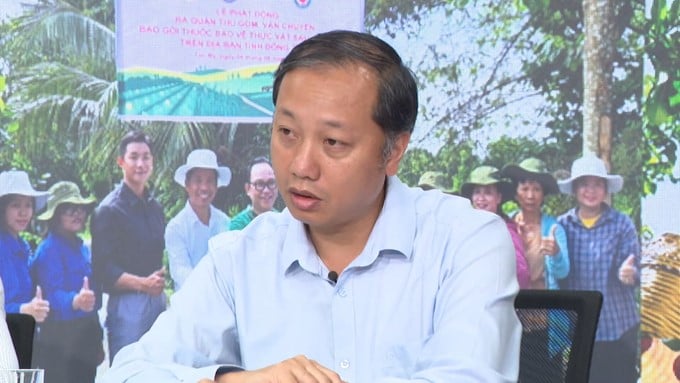December 1, 2025 | 12:26 GMT +7
December 1, 2025 | 12:26 GMT +7
Hotline: 0913.378.918
December 1, 2025 | 12:26 GMT +7
Hotline: 0913.378.918

Seminar "Proper understanding of pesticides" on the afternoon of November 8 in Hanoi. Photo: CLV.
On the afternoon of November 8 in Hanoi, the Plant Protection Department, CropLife Vietnam Association, Vietnam Pesticide Association (VIPA), and Rural Area Today/Dan Viet Newspaper organized a seminar "Proper understanding of pesticides." This seminar aims to provide information to help farmers understand and use pesticides more safely and effectively.
Talking at the seminar, Mr. Nguyen Quang Hieu, Deputy Director of the Plant Protection Department, and experts affirmed that pesticides play a very important role in ensuring productivity, quality, and food security.
According to Mr. Hieu, regarding the export value of agricultural, forestry, and fishery products in 2024, Deputy Minister Phung Duc Tien expressed confidence that Vietnam will reach USD 60 billion. According to newly updated data from the Plant Protection Department, the fruit industry alone reached an export value of USD 6 billion, an increase of about 10% compared to the whole year of 2023 and more than 30% compared to the same period last year. "This result is achieved thanks to compliance with regulations of export markets," said Mr. Hieu.
In 2024, the Ministry of Agriculture and Rural Development (MARD) and the Plant Protection Department have been very actively negotiating to open the market. Vietnam has opened many markets through new protocols, showing that Vietnamese agricultural products increasingly meet the requirements of exporting countries.
Accordingly, the registration and use instructions for pesticides have also made positive progress. Especially, training for farmers to comply with regulations achieved encouraging results.

Mr. Nguyen Quang Hieu, Deputy Director of the Plant Protection Department (Ministry of Agriculture and Rural Development), talked at the seminar. Photo: CLV.
Regarding the current list of pesticides, Vietnam has about 800 trade names, of which biological pesticides account for about 18%. With an abundant amount of types and products, farmers have easier options in managing harmful organisms through the use of pesticides.
Mr. Hieu said the Plant Protection Department is assigned the annual task of conducting reviews and assessments to identify at-risk pesticide products. Products that affect humans or the environment will be proposed by the Plant Protection Department to MARD to develop a roadmap for elimination.
To ensure compliance with regulations on pesticide residues, MARD and the Plant Protection Department regularly organize training programs for relevant organizations and individuals, especially on selection, classification, and use of pesticides according to the principle of "4 rights." This helps farmers comply well with regulations, contributing to improving the value of exported agricultural products.
Regarding pesticide management in Vietnam, Ms. Bui Thanh Huong, Head of the Pesticides Office (Plant Protection Department), said that all legal documents, such as laws, decrees, and circulars guiding standards and norms on pesticides, have now been developed synchronously from central to local levels. Up to now, we have full legal documents on pesticide management in harmony with regional countries and international organizations. In particular, Vietnam clearly decentralizes management from central to local levels.
The Law on Plant Protection and Quarantine was developed in 2013 and will take effect from January 1, 2025. After nearly 10 years of implementation, the Plant Protection Department is reviewing the regulations. "This is a very stable law because we have had a 10-year construction process," Ms. Huong commented.
Regarding regulations on pesticide management, the Law on Plant Protection and Quarantine clearly stipulates that pesticides are a conditional business commodity and must be managed according to a list. Therefore, MARD annually issues a list of pesticides permitted for use in Vietnam.

The fruit industry has grown dramatically thanks to effective pesticide management. Photo: CLV.
In addition, Circular 09/2023/TT-BNNPTNT regulates the lists of pesticides permitted and prohibited for use in Vietnam, including 460 active ingredients out of about 4,500 trade names of pesticides permitted for use and about 31 active ingredients on the prohibited list.
Regarding the labeling of pesticides, the representative of the Plant Protection Department noted that traders must comply with regulations on labeling of goods as stated in Circular 21/2015/TT-BNNPTNT on pesticide management. Therefore, after registering on the list of pesticides permitted for use in Vietnam, organizations and individuals need to certify product quality conformity before circulating on the market.
Ms. Huong affirmed: "All regulations and management mechanisms related to the circulation, production, and trading of pesticides have been established very clearly and transparently, contributing to the effectiveness of pesticide management in recent times.".
Translated by Thu Huyen

(VAN) The Institute of Agricultural Sciences for Southern Vietnam (IAS) marked its 100th anniversary in Ho Chi Minh City, celebrating a century of growth as a leading institute contributing significantly to Viet Nam’s agricultural development.

(VAN) An increasing number of livestock farms are using biogas generators to create a source of renewable electricity, helping to save costs and mitigate environmental pollution.

(VAN) Small changes in rice cultivation, from irrigation methods and straw collection to input management, are paving a new way for Vietnam's agriculture in the journey toward emission reduction.

(VAN) With the project of converting biogas into renewable electricity, Australia is both helping pig farms reduce their energy costs by up to 25% and contributing to environmental protection.
![Hue aims for Net Zero: [1] Initial steps from green transportation](https://t.ex-cdn.com/nongnghiepmoitruong.vn/608w/files/huytd/2025/11/28/0853-anh-6-giao-thong-xanh-hue-094717_940-153724.jpg)
(VAN) For sustainable development, Hue City is implementing many solutions to promote green transportation, which is an important initial step on the journey to building a Net Zero Hue.

(VAN) Nghe An Province, one of the localities with the largest forest area in Vietnam, is set to gain significant benefits from the implementation of forest carbon credit payments.

(VAN) Circular agriculture helps Mekong Delta farmers cut greenhouse gas emissions while boosting incomes through efficient reuse of agricultural by-products.